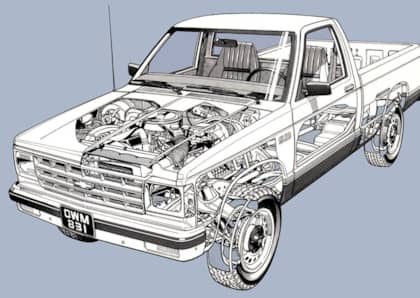A History Of The 1973-1979 Ford F-Series, The Forgotten Classic Truck You Can Still Afford
The early 1970s saw Ford and Chevrolet go in two different directions with their respective full-size trucks. While Chevrolet launched the third-generation 'square body' C/K for 1973 on a new, modernized platform (that would last until nearly the end of the following decade), Ford elected to stay the course with the F-Series that very same model year.

Rather than make the move to a new chassis—which wouldn't arrive until 1980—Ford built the sixth generation of the F-Series pickup on the same frame and suspension that dated back to its 1965 model. That being said, the company made sure to include enough updates and feature changes over the course of the next seven years to elevate the F-100 and its new F-150 cousin to the top of the American pickup truck sales charts.
Dentside Arrives
In terms of appearance, the 1973 Ford F-Series owed a lot to the models that had come before it. Cautious about upsetting brand loyalists, the new pickup kept roughly the same shape, adding a 'dent' in the side sheet metal that stretched from front to rear (giving the trucks the 'dentside' nickname) as well as a more pronounced clamshell hood (with reinforced internal bracing for less shake) and a taller grille.

A six-passenger extended 'Supercab' model was introduced in 1974 (also available with jumpseats instead of the rear bench).

Although the chassis might have been a holdover, Ford's engineers worked to improve as many aspects of the truck as they could/ This included a larger greenhouse with curved door glass, a stamped bed, and rounded corners on the truck's floor. Rust-proofing was improved, and the fuel tank was repositioned to the rear of the truck from under the cabin, adopting the under-bed location it would occupy for the next several decades and allowing for a more comfortable seating position in the passenger compartment.
Big V8, Big Six
Mechanically, all trucks saw a wider rear track, which improved stability, while the long-wheelbase F-350 provided a higher gross vehicle weight rating intended to satisfy those who towed or went camping with their trucks. Disc brakes were installed on two-wheel drive trucks from the start, with 4x4 models gaining the feature by 1976.

Engine choices included the typical array of straight six-cylinder and V8 options, but a few important power plants appeared on the options sheet starting in 1974. The first was Ford's 460 cubic inch big block, which remained in the F-Series family until 1997.

For the sixth-generation truck it produced up to 350 lb-ft and was a favorite for heavy-duty customers. Another popular long-term addition was the 300 cubic inch six, an unkillable engine that had briefly left truck portfolio at the beginning of the '70s but which would stick around just as long as the 460 upon its reintroduction.
Free Wheelin' Fun
After keeping things relatively milquetoast throughout the 1960s, Ford spent the following decade experimenting with equipment offerings, trim levels, and sticker packages to try and soak up the new enthusiasm Americans had for light-duty trucks.

These included the 'Free Wheelin' package that provided sunset-like decals on the doors and box (as well as the option of a canary yellow paint job), as well as Bicentennial, Indy 500, and Super Camper Special pickups.

The F-250 'Highboy' was also a popular choice for off-road enthusiasts, as its 6-inch lift and divorced transfer case made it one of the last of its breed before it departed at the end of 1977.

Ford also updated styling on the F-Series not once, but twice, making minor cosmetic changes to the 1976 model year before going all-out with a front-end redesign in 1978 (egg crate grille, new rectangular headlights) that also included a quieter cabin.

Perhaps the most important introduction made by the 1973-1979 Ford F-Series, however, was the F-150 model. Positioned just above the long-standing F-100, it provided better hauling and towing capability thanks to its uprated shocks, springs, and axles.

It was a move that spelled the eventual end of the F-100, which bowed out in the early '80s, as the F-150 proved to be an incredibly popular vehicle not just with Ford fans but across the entire country, at long last outperforming Chevrolet and taking the top sale spot which it has yet to relinquish
Open Season For Collectors
Today, the sixth-generation F-Series occupies an unusual position among classic truck collectors. Not quite as modern as their Chevrolet counterparts, the '73-79 trucks haven't attracted nearly the same amount of attention, and given their relatively short run don't enjoy similar levels of specific aftermarket support. This has helped to keep prices low, making them among the most affordable old school pickups on the market.

Despite being a somewhat obscure choice, their parts sharing with previous F-Series trucks, as well as their use of common Ford engines, means they are not particularly difficult to repair or restore. The galvanized steel and fewer box seams have also helped the trucks survive the tin worm over the course of the decades, and with millions built examples are plentiful. The 1973-1979 Ford F-100, F-250, F-350, and eventual F-150 represent an appealing point of entry for Blue Oval fans seeking an under appreciated pickup.







